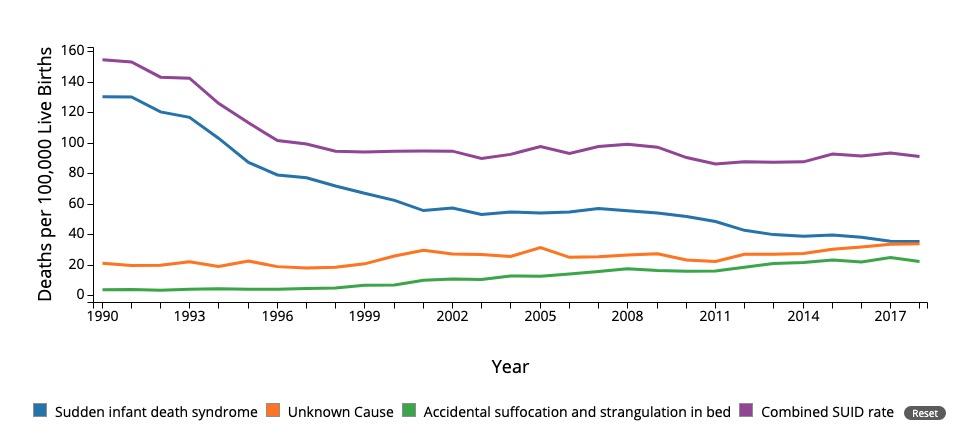Playlist
Show Playlist
Hide Playlist
Sudden Infant Death Syndrome (SIDS)
-
Slides ALTBRUESID Pediatrics.pdf
-
Download Lecture Overview
00:01 Quickly, let’s touch base about SIDS. 00:03 SIDS is sudden infant death syndrome n children. 00:07 It’s a sudden death in a child under a year of age with no identifiable cause. 00:13 This is not associated with BRUEs or ALTEs. 00:16 This is just really bad luck in many cases, although there are some things we can identify that might put kids at increased risk. 00:24 So this is the number one cause of death in infants between 1 and 12 months of age in the United States. 00:30 The average is 11 weeks. 00:32 The peak incidence is two to four months. 00:35 And more than 90% happen before the six month period. 00:39 And here, you can see a list of potential causes over the years and you can see that what we’ve done is we’ve effectively reduced the rate of SIDS. 00:49 Look at that green line and how much it dropped off through public intervention in preventing this problem from happening. 00:56 So what are the things we’ve talked about? First, parents shouldn’t smoke. 01:01 Smoking around your child increases their risk of death. 01:06 Sudden death is more likely among kids whose parents smoke. 01:10 The reason is that the smoke and even if you can just smell it, that’s enough, irritates the tonsils and the adenoids in the young infants, they can grow and they may have an obstruction of their airway that they can’t overcome while they’re trying to sleep. 01:25 Next, don’t co-sleep with your infant. 01:29 Parents rolling over on infants is one of the top causes of sudden infant death syndrome. 01:34 The parent has suffocated the infant. 01:37 Parents should know that it’s okay to have a bassinet right by the bed and there are all kinds of different contraptions that they sell where the baby can safely sleep after the mom has breastfed. 01:48 And it’s convenient to have it right next to the bed because obviously mom is very tired and has to breastfeed many times throughout the night. 01:55 Next is unsafe sleeping practices or sleep hygiene of the crib. 02:00 The baby should not have pillows and excessive blankets or stuffed animals or other things. 02:05 It should be simple empty crib and the baby could be swaddled or sleep in a nightie. 02:12 So if you see patients whose parents have suffered with a child with SIDS, it’s important to ask them about a few questions. 02:22 First, ask for risk factors for non accidental trauma. 02:26 Remember, it’s not uncommon for kids to have abusive head trauma, brain damage and then die and there won’t be any obvious external source. 02:35 There are cases of parents who had multiple SIDS deaths. 02:38 They are all described as SIDS and then later, they found out that this was a case of recurrent non accidental trauma. 02:47 Ask about a history of SIDS in the family because that may increase the likelihood of not only child abuse, but also certain metabolic conditions which may be predisposing infants to SIDS. 02:58 A post-mortem is always indicated in SIDS babies to try and find out what caused it, both genetic or child abuse cases. 03:05 And grief counselling is incredibly important. 03:09 Patients who suffer from SIDS, parents, will never recover their entire lives. 03:15 And grief counselling is critical to helping them get back on their feet and more productive in terms of getting on with their lives. 03:23 So that’s my review of ALTE, BRUE and SIDS in infants. 03:27 Thanks for your time.
About the Lecture
The lecture Sudden Infant Death Syndrome (SIDS) by Brian Alverson, MD is from the course Pediatric Emergency Medicine.
Included Quiz Questions
Which of the following group of infants is at increased risk for sudden infant death syndrome (SIDS)?
- Infants with mothers who smoke cigarettes
- Infants with a previous episode of brief, resolved, unexpected event (BRUE)
- Infants who sleep in bassinets
- Infants with sickle cell disease
- Infants who are swaddled
Which of the following is an appropriate recommendation when discussing the risk of sudden infant death syndrome with parents?
- Avoid smoking as it increases the risk of SIDS.
- Do not breast feed your infant during the night.
- Share the bed with your infant.
- Use abundant pillows and blankets in the bassinet
Which of the following best defines sudden infant death syndrome (SIDS)?
- Unexplained death in a seemingly healthy child under 1 year of age
- Unexplained death in a seemingly healthy child under 2 years of age
- Death in a child under 1 year of age due to a previously unidentified congenital heart disease
- Death in a child under 2 years of age due to a previously unidentified congenital heart disease
Customer reviews
5,0 of 5 stars
| 5 Stars |
|
5 |
| 4 Stars |
|
0 |
| 3 Stars |
|
0 |
| 2 Stars |
|
0 |
| 1 Star |
|
0 |




